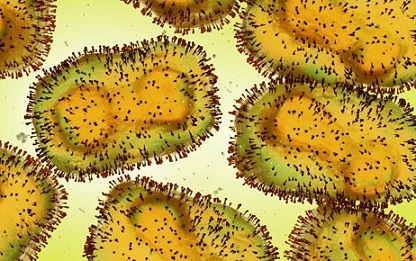Nikhil Prasad Fact checked by:Thailand Medical News Team Aug 19, 2024 9 months, 4 days, 5 hours ago
Mpox News: Researchers from Ruhr University in Bochum and Heinrich-Heine-University in Düsseldorf, Germany, have made a significant discovery regarding the surface stability of the Mpox virus (formerly known as monkeypox virus). This
Mpox News report delves into the study, which demonstrates that the Mpox virus can remain viable on stainless steel surfaces for up to 30 days, depending on the temperature. The findings emphasize the critical need for effective hygiene measures to mitigate the spread of this virus during outbreaks.
 Mpox virus shows prolonged surface survival especially at lower temperatures
Prolonged Surface Stability of Mpox Virus
Mpox virus shows prolonged surface survival especially at lower temperatures
Prolonged Surface Stability of Mpox Virus
The study, published in The Journal of Infectious Diseases, provides crucial insights into the behavior of the Mpox virus under different environmental conditions. The research team examined the virus's survival on stainless steel discs at various temperatures - 39.2°F, 71.6°F, and 98.6°F. The results revealed that the virus remained viable for different lengths of time based on the temperature, with lower temperatures significantly prolonging its survival.
At a higher temperature of 98.6°F, the virus lost its ability to reproduce after six to seven days. However, at room temperature (71.6°F), the virus could survive for up to 11 days.
The most alarming finding was at the cold temperature of 39.2°F, where the virus persisted for up to 30 days. This discovery underscores the resilience of the Mpox virus and highlights the potential risk of transmission from contaminated surfaces, even after several weeks.
The Impact of Temperature on Virus Viability
The study showed a clear correlation between temperature and the longevity of the Mpox virus on surfaces. The cooler the environment, the longer the virus remained infectious. This aspect of the study is particularly concerning for environments like refrigerated areas or colder climates, where the virus could potentially survive for extended periods.
The researchers used stainless steel discs to simulate common surfaces that might come into contact with the virus in various settings, such as hospitals, households, and public spaces. The initial virus concentration was maintained for the first 24 hours, regardless of the temperature. However, after this period, the virus began to decline in infectivity, with the rate of decline heavily influenced by the surrounding temperature.
Disinfectant Effectiveness Against Mpox Virus
In addition to studying the virus's stability, the researchers also tested the efficacy of five commercially available disinfectants. The study found that alcohol-based and aldehyde-based disinfectants were highly effective in inactivating the Mpox virus. These disinfectants achieved a significant reduction in the virus's infectivity, making them reliable options for surface cleaning in environments where the virus may be present.
gt;
However, not all disinfectants performed equally. A hydrogen peroxide-based product tested in the study was less effective, showing only moderate inactivation of the virus. This finding suggests that while hydrogen peroxide-based products may be suitable for general cleaning, they may not be the best choice for environments where the Mpox virus is a concern.
The World Health Organization (WHO) recommends using alcohol-based disinfectants for surface cleaning to prevent the spread of viruses like Mpox. The study's results support this recommendation, particularly in light of the virus's prolonged survival at lower temperatures.
Broader Implications and Unanswered Questions
While the study provides valuable insights, it also raises several questions about the survival of the Mpox virus on different materials and under various environmental conditions. The research primarily focused on stainless steel surfaces, but it remains unclear how long the virus might persist on other surfaces commonly found in homes and workplaces, such as fabrics, wood, or plastic.
Moreover, the study did not address the impact of other environmental factors like humidity or sunlight on the virus's survival. These factors could further influence the virus's longevity on surfaces and, by extension, the risk of transmission.
Understanding the full scope of how the Mpox virus behaves in different environments is essential for developing comprehensive hygiene guidelines. Future research should explore these variables to provide a more complete picture of the risks associated with surface contamination.
Practical Implications for Hygiene Practices
The study's findings emphasize the importance of maintaining rigorous hygiene practices, especially in environments where the Mpox virus may be present. High-touch surfaces, such as doorknobs, handles, and other frequently used objects, should be regularly disinfected with effective products like alcohol-based cleaners. This is particularly crucial in healthcare settings, where the risk of virus transmission is higher.
It is also important to note that while surface contamination is a potential route of transmission, it is not the primary means by which the Mpox virus spreads. Direct contact with infected individuals or their bodily fluids remains the most common mode of transmission. Nevertheless, reducing the risk of surface transmission through proper disinfection practices is a key component of controlling outbreaks.
Conclusion
The study conducted by researchers from Ruhr University and Heinrich-Heine-University highlights the remarkable resilience of the Mpox virus on surfaces, particularly at lower temperatures. The virus's ability to survive for up to 30 days on stainless steel surfaces underscores the need for vigilant hygiene practices, especially in environments where the virus may be present.
The findings reinforce the importance of using effective disinfectants, such as alcohol-based products, to mitigate the risk of transmission. As the Mpox virus continues to pose a public health challenge, understanding its behavior on surfaces and ensuring proper disinfection protocols are in place will be critical in controlling its spread.
The study findings were published in the peer-reviewed journal: The Journal of Infectious Diseases.
https://academic.oup.com/jid/article/228/9/1227/7147639
For the latest
Mpox News, keep on logging to Thailand Medical News.
Read Also:
https://www.thailandmedical.news/news/mpox-monkeypox-can-also-cause-vascular-inflammation-and-affect-cardiovascular-health
https://www.thailandmedical.news/news/monkeypox-mpox-can-cause-a-variety-of-eye-issues-that-can-result-in-vision-loss
